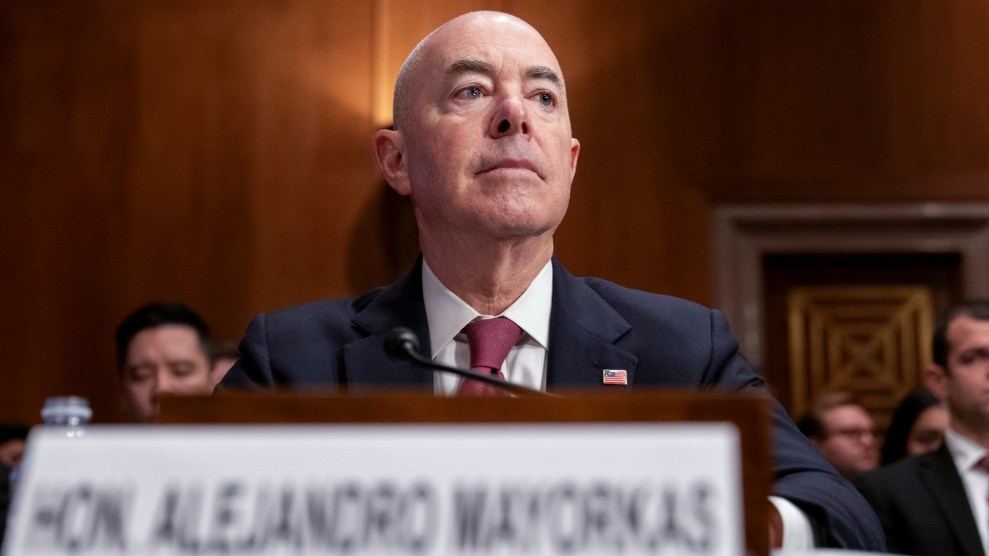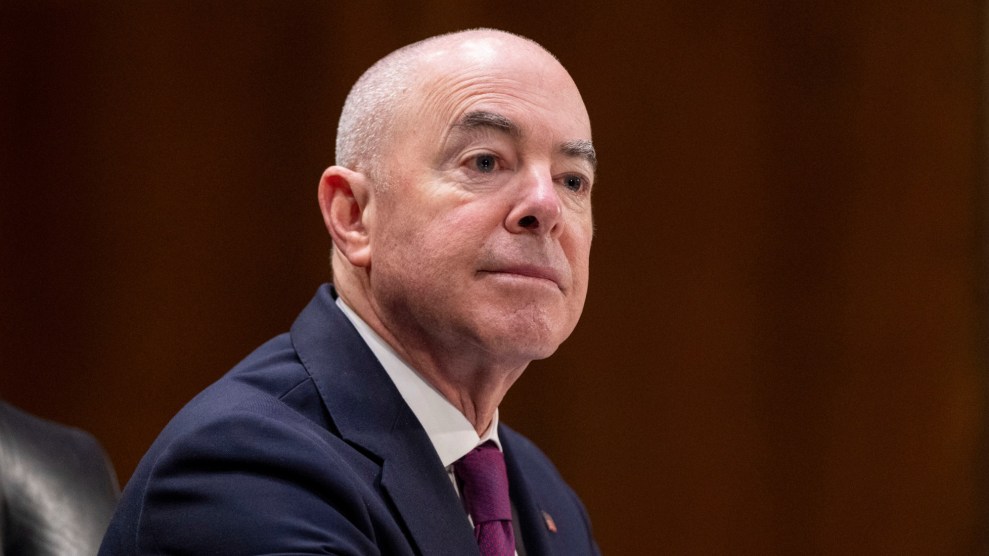
Secretary of Homeland Security Alejandro Mayorkas testifies during a Senate Homeland Security and Governmental Affairs Committee hearing .Stephanie Scarbrough/AP
After failing to muster enough votes last week, House Republicans approved two articles of impeachment against Department of Homeland Security Alejandro Mayorkas. Democrats and constitutional law experts have decried the proceedings, which charge Mayorkas with “willful and systemic refusal to comply with the law” and “breach of public trust,” as a baseless “political stunt.”
“I knew I was entering an extraordinarily polarizing environment, an environment where norms were in jeopardy, where civility was not always respected,” Mayorkas told the Los Angeles Times. “I didn’t assume this.”
The House impeachment of Mayorkas will likely go down in history as one of the most futile uses of this constitutional power. Throughout, Republicans have had trouble distinguishing what makes Mayorkas’ conduct impeachable. Many wanted a crackdown at the border. But, as Rep. Tom McClintock (R-Calif.), one of the holdouts from the last impeachment told CNN, removing Mayorkas for disagreements on border policy would amount to “redefining the fundamental definition of impeachment” away from misuse of power to political differences.
Here’s a brief timeline of how we got to a hard-to-comprehend moment:
Feb. 2, 2021: The Senate confirms Alejandro Mayorkas as DHS Secretary. The son of Cuban refugees, he becomes the first Latino and immigrant to lead the department.
March 17, 2021: Mayorkas testifies before Congress for the first time amidst a spike in arrivals of unaccompanied minors at the border.
Aug. 12, 2021: Rep. Andy Biggs (R-Ariz.) becomes the first lawmaker to move to impeach Mayorkas, accusing the DHS secretary of “reckless abandonment of border security and immigration enforcement.” At the time, Biggs falsely claimed that the DHS secretary was “systematically releasing COVID-19 positive aliens into our communities.”
Oct. 2021: GOP Texas Rep. Chip Roy circulates among his fellow Lone Star Republican lawmakers a memo, which Fox News has an exclusive on, making a case to impeach Mayorkas. “Republicans should unify behind that message and push against the President and Mayorkas,” Roy tells Tucker Carlson, “to impeach them both.”
Nov. 16, 2021: Mayorkas testifies at a Senate Judiciary Committee hearing on immigration where Republicans grill him on the number of migrant encounters and a proposed settlement payment to families separated under the Trump administration.
Nov. 21, 2022: “It will be a happy day when Mayorkas leaves DHS and an adult takes over,” the National Border Patrol Council, the union representing some 18,000 agents, posts on X.
Dec. 13, 2022: Republicans hold a press conference with former Trump administration border officials calling on then-House Speaker Kevin McCarthy to pursue articles of impeachment against Mayorkas.
Jan. 10, 2023: Rep. Pat Fallon (R-Texas) files articles of impeachment against Mayorkas for high crimes and misdemeanors.
Feb. 2023: DHS hires a law firm to help with the response to a potential impeachment process.
April 2023: Chairman of the House Committee on Homeland Security Mark Green (R-Tenn.) reportedly tells donors “get the popcorn—Alejandro Mayorkas comes before our committee, and it’s going to be fun.”
April 19, 2023: At a House Committee on Homeland Security hearing, Mayorkas tells lawmakers the “border is secure.” Rep. Marjorie Taylor Greene (R-Ga.) is silenced after calling the secretary a “liar.”
July 26, 2023: Rep. Jim Jordan (R-Ohio) holds a House Judiciary Committee hearing where Republican lawmaker Ken Buck of Colorado (who has voted against the impeachment) said his constituents consider Mayorkas a “traitor.” Democratic Rep. Sheila Jackson Lee calls out Republicans, saying “this is an oversight hearing, not an impeachment hearing.”
Nov. 9, 2023: Marjorie Taylor Greene introduces a motion calling for the impeachment of Mayorkas to try and force a vote. The House blocks her efforts and sends the resolution to the House Committee on Homeland Security. This does stop Greene from trying again and filing a second motion accusing the secretary of failing to “maintain operational control of the border” and violating the Secure Fence Act of 2006. (She later backs down.)
Jan. 2024: House Republicans recruit two lawyers: Paul Taylor, a Republican Counsel for the House Judiciary Committee who defended Trump in the 2019 impeachment case as minority counsel, and George Fishman, a former DHS official under Trump and a senior legal fellow at the Center for Immigration Studies.
Jan. 28, 2024: House Republicans unveil articles of impeachment against Mayorkas. In a memo rebutting the accusations, DHS says Republicans have failed to prove that Mayorkas committed high crimes or misdemeanors and calls the process a “transparent attempt to appease their most extreme Members.”
Jan. 29, 2024: Greene claims credit for the House impeachment proceedings. “Absolutely this is happening because I forced that floor vote,” she told The Hill.
Jan. 30, 2024: After more than 10 hours of debate, the House Committee on Homeland Security approves and moves the articles of impeachment to the House Floor in a 18-15 vote along party lines.
Feb. 6, 2024: House votes 214-216 against the articles of impeachment. Reps. Michael Gallagher (R-Wis.), Ken Buck (R-Colo.), Tom McClintock (R-Calif.), and Blake Moore (R-Utah) joined Democrats in voting no. Rep. Steve Scalise (R-La.) was absent.
Feb. 13, 2024: Despite three “no” votes from GOP lawmakers, House Republicans manage to adopt the impeachment resolution with a 214-213 vote. It is likely to go nowhere in the Democrat-led Senate.
















